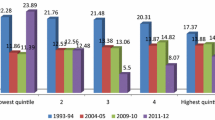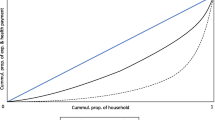Abstract
The Turkish healthcare system has been subject to major reforms since 2003. During the reform process, access to public healthcare providers was eased and private providers were included in the insurance package for public insurees. This study analyzes data on out-of-pocket (OOP) healthcare expenditures to look into the impact of reforms on the size of OOP health expenditures for premium-based public insurees. The study uses Household Budget Surveys that provide a range of individual- and household-level data as well as healthcare expenditures for the years 2003, before the reforms, and 2006, after the reforms. Results show that with the reforms ratio of households with non-zero OOP expenditure has increased. Share and level of OOP expenditures have decreased. The impact varies across income levels. A semi-parametric analysis shows that wealthier individuals benefited more in terms of the decrease in OOP health expenditures.


Similar content being viewed by others
Notes
A health insurance program for the impoverished covered about 15% of population in 2010.
There has also been a major change in the extent of coverage for those who cannot afford to pay health-insurance premiums. Through a program called “Green Card”, a large part of uninsured population has been covered for inpatient and outpatient services. For a discussion of the health expenditures by poor and recent reforms in Turkey, see Aran and Hentschel [1].
The number of people covered by these institutions is not very clear. According to SII statistics, active and retired civil servants make about 15% of population, while SII and BK cover 50 and 23% of the population, respectively. SII statistics provide the number of dependents through a raw estimation and may not be accurate. It should also be noted that BK count includes both active and inactive members. It may be overstating the number of actively insured members.
The Green Card program covers healthcare expenditures of those earning less than one-third of the minimum wage. The card is given after a thorough investigation and is renewed every year. In 1992, when the program was initiated, it covered only inpatient healthcare expenditures. In 2004, outpatient expenditures and in 2005 drug expenses were also included in the coverage. As of 2008, the number of Green Card holders were about 9 million.
Since 2006, efforts to assemble the three social security institutions under one roof have intensified. In 2008, a general health insurance plan, aiming at universal coverage, was put in place—the accomplishments of which, as of 2009, are yet to be seen. As part of the transformation, the public health insurance schemes have been collected under one roof.
Starting from 2010, surcharge was allowed to change between 30 and 70% depending on the quality of hospital.
The closest substitute is Turkish Demographic and Health Survey of 2003 and 2008. The micro data for 2008 were not publicly available yet and does not provide a data set as rich as the Household Budget Surveys.
Initially, we tried to use the uninsured as a control group, but their numbers have been halved during this period from 30% of population to 15% (10% point into Green Card holders and 5% points to public insurance) making them difficult to use as controls.
Income is also available in the data, but total expenditures are indicated to be more reliable. Using income variable did not significantly change the results.
One may alternatively consider a Tobit-like analysis with the whole sample to account for households with no health expenditure. In the absence of variables for health status/needs, this turns out to be futile.
References
Aran, M., Hentschel, J.: Household Level Health Expenditures and Health Insurance Coverage of the Poor in Turkey. World Bank (forthcoming)
Bugra, A., Keyder, C.: The Turkish welfare regime in transformation. J. Eur. Soc. Policy 16(3), 211–228 (2006)
Eder, M.: Retreating state? Political economy of welfare regime change in Turkey. Middle East Law and Governance 2(2), 152–184 (2010)
Agartan, T.: Health Sector Reform in Turkey: Old Policies New Politics. Paper presented at the 2005 ESPANET Young Researchers Workshop, 2005
OECD and World Bank. Reviews of Health Systems: Turkey. OECD and IBRD/The World Bank (2008)
Wagstaff, A., Lindelow, M.: Can Insurance Increase Financial Risk? The Curious Case of Health Insurance in China. J. Health Econ. 27, 990–1005 (2008)
Knaul, F., Frenk, J.: Health insurance in Mexico: achieving universal coverage through structural reform. Health Affairs 24(6), 1467–1476 (2005)
Sepehri, A., Sarma, S., Simpson, W.: Does non-profit Health Insurance Reduce Financial Burden? Evidence from the Vietnam living standards survey panel. Health Econ. 15(6), 603–616 (2006)
Ekman, B., Liem, T., Duc, A., Axelson, H.: Health insurance reform in Vietnam: a review of recent developments and future challenges. Health Policy Plan. 23(4), 252–263 (2008)
Borissov, V., Rathwell, T.: Health care reforms in Bulgaria: an initial appraisal. Soc. Sci. Med. 42(11), 1501–1510 (1996)
Earl-Slater, A.: Health-care reforms in the Czech Republic. J. Manag. Med. 10(2), 13–22 (1996)
Alan, S., Crossley, T., Grootendorst, P., Michael, V.: The effects of drug subsidies on out-of-pocket prescription drug expenditures by seniors: regional evidence from Canada. J. Health Econ. 21, 805–826 (2002)
Sulku, S., Bernard, D.: Financial burden of health care expenditures in Turkey: 2002–2003. Agency for Healthcare Research and Quality Working Paper No. 09004 (2009)
Akbulut, Y., Sarp, N., Ugurluoglu, E.: Reform of the health care system in Turkey: a review of universal health insurance. World Hosp. Health Serv. 43(1), 13–16 (2007)
Hanehalkı Bütçe Anketi, 2003–2006.: TÜİK (Turkish Statistics Institution)
World Bank: Turkey: Country Economic Memorandum-Structural Reforms for Sustainable Growth. World Bank Report No. 20029-TU, (2001)
Adaman, F.: Study on the Social Protection Systems in Turkey. Entry for the report Study on the Social Protection Systems in the 13 Applicant Countries, prepared for European Commission (2003)
Altınok, M., Üçer, A.: Sağlıkta Dönüşüm Sürecinde Sağlık Harcamaları (Health Expenditures in Tarnsformation in Health Process). http://www.tipkurumu.org/files/SagliktaDonusumSurecindeSaglikHarcamalari-son.doc. Accessed on January 21, 2011
Tatar, M., Ozgen, H., Sahin, B., Belli, P., Berman, P.: Informal payments in the health sector: a case study from Turkey. Health Aff. 26(4), 1029–1039 (2007)
Acknowledgments
This work has benefited from a financial grant from the Economic Research Forum (ERF). The content and recommendations do not necessarily reflect the views of the Economic Research Forum.
Author information
Authors and Affiliations
Corresponding author
Rights and permissions
About this article
Cite this article
Erus, B., Aktakke, N. Impact of healthcare reforms on out-of-pocket health expenditures in Turkey for public insurees. Eur J Health Econ 13, 337–346 (2012). https://doi.org/10.1007/s10198-011-0306-2
Received:
Accepted:
Published:
Issue Date:
DOI: https://doi.org/10.1007/s10198-011-0306-2




